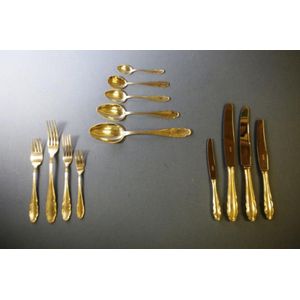George III Sterling Silver Cutlery Set with Stag Crest
You must be a subscriber, and be logged in to view price and dealer details.
Subscribe Now to view actual auction price for this item
When you subscribe, you have the option of setting the currency in which to display prices to $Au, $US, $NZ or Stg.
- George Iii - George III (1738 - 1820) was King of Great Britain and Ireland from 1760 to 1820.
- Georgian - As an English stylistic period, Georgian is usually taken to cover the period from George I (1714) to the Regency of Prince George (1811-20), although the period from 1800 to 1830 is sometimes designated as the Regency period. During the Georgian period the great English cabinetmakers and designers such as Chippendale, Hepplewhite, Adam Sheraton etc., were all active.
Therefore there isn't a single 'Georgian style' as such and to say something is 'Georgian', usually means it was made between 1714 and 1830. This assumes we discount George V and George VI, both being from the 20th century.
The styles popular at the time of each reign were:
George I (1714-1727) saw out the last years of the Baroque period.
George II (1727-1760) reigned during the Rococo period.
George III (1760-1820) saw the last gasp of the Rococo, all of the early Neo-Classic 'Adam style' and most of the later neo-Classic 'Regency style'.
George IV (Prince Regent 1820-1830)encompassed the last of the 'Regency' style.
William IV's reign (1830-1837) was something of a no man's land (stylistically) and he wasn't a 'George' anyway. He covered the last glimmerings of 'Regency' and the start of the 'Victorian' style. - Marrow Spoon - A spoon with a long handle and a narrow scoop shaped bowl, used to scoop and eat marrow from the hollow centre of roasted bones. Some marrow scoops are double ended with a different shaped bowl at each end.
- Hallmarks - A mark stamped on articles of precious metals in Britain, since the 14th century, certifying their purity. It derives its name from the Guild Hall of the Goldsmiths' Company, who recieved its Charter in 1327 giving it the power to assay (test the purity) and mark articles of gold and silver.
The hallmark will consist of several marks, including the:
- silver standard mark, indicating the purity of the metal. Sterling silver is .925 pure silver.
- the city mark indicating the city in which it was assayed eg London, Birmingham, York etc.
- the date mark, usually a letter of the alphabet in a particular font and case,
- a duty mark, indicating whether duty had been paid to the crown, and only in use from 1784 to 1890
The piece may include an additional mark, the maker's mark, although not forming part of the hallmark, will be located in the vicinity of the hallmarks.
Sometimes silver plated items will bear faux hallmarks, often confusing those not familiar with silver markings. - Sterling Silver - Sterling silver is a mixture of 92.5% pure silver and 7.5% of another metal, usually copper. Fine silver is 99.9% pure silver, and is relatively soft and the addition of the very small amount of copper gives the metal enough strength and hardness to be worked into jewellery, decorative and household objects.
- Old English Pattern - The Old English pattern as is commonly seen on silver flatware is characterized by a simple, clean shape with a slightly upturned tip and a broad handle that tapers gently towards the bowl or blade. The handle may be plain or decorated with a subtle design, such as a line or ridge along the edge or a small decorative motif at the tip. This pattern was first introduced in the 18th century and has remained popular ever since, making it a popular choice for traditional and formal table settings.
This item has been included into following indexes:
-
silver cutlery / flatware, patterns
- Old English pattern 519
- stag pattern 10
- silver cutlery / flatware, settings - unboxed 1,448
Visually similar items

Six sterling silver serving spoons, hallmarked London 1911, 360gms approx.

Extensive set German sterling silver cutlery, total of 185 pieces, marked 800, with settings for 12. Including knives, forks, and spoons for dinner, entree and fish etc, and an additional 16 serving pieces. Total weight of all pieces, 9,372 grams approx, w

Ten silver spoons and forks, Victorian etc. (10) total weight approx 250g

A Polish 800 silver part flatware service, maker's mark B.W, Warsaw, second quarter 20th century, sixty-three pieces, comprising twelve steel-bladed dinner knives, twelve dessert forks, eight dessert spoons, seven tea spoons, twelve coffee spoons, six cake
